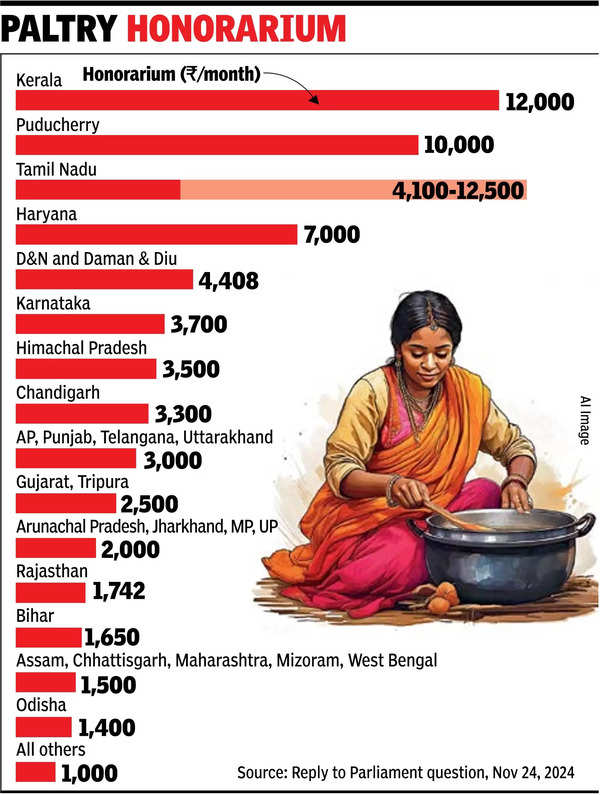The ‘honorarium’ for working six to eight hours as cooks-cum-helpers in the midday meal programme has remained unchanged at Rs 1,000 per month since it was fixed in 2009. Adjusted for inflation, the value of Rs 1,000 now is just over Rs 540 per month 15 years back. The actual money they get depends on how much the state govt is willing to enhance this. While Kerala pays Rs 12,000, in many like Delhi, Goa and several northeastern states it remains just Rs 1,000.
National Floor Minimum Wage, below which no state can fix its minimum wage, is Rs 5,340 per month, about Rs 178 per day. However, since cook-cum-helpers (CCH) are not recognised as workers, govt is not bound to pay minimum wages. The honorarium of Rs 1000 works out to be just Rs 33 per day. ” CCHs are honorary workers who have come forward for rendering social services,” govt has repeatedly maintained in answers to questions in Parliament.

The honorarium expenditure of Rs 1,000 is shared between the Centre and states and UTs as per an approved sharing pattern of 90:10 in Northeastern states, Himalayan states (Uttarakhand and Himachal Pradesh) and Jammu & Kashmir, 100% in UTs without legislature and 60:40 for other states as well as Delhi and Puducherry. In effect, for most states the Centre pays just Rs 600 towards the honorarium of each CCH.
“With the price of everything rising, how can you possibly survive on Rs 1,600 per month? Just a kilo of daal costs Rs 150 and a kilo of onion costs Rs 80. They don’t even pay it regularly. They pay after four to six months,” said Kiari Dev, who has been working as a CCH for over 12 years in Sapthiahi village in Saharsa district, Bihar. Hundreds of them from several states including Uttar Pradesh, Bihar, Odisha, Karnataka and Himachal Pradesh gathered in Jantar Mantar on Tuesday under the banner of Mid-Day Meal Workers Federation of India demanding increase in wages, regularisation of their work, social security benefits, extension of the scheme to all children up to class XII and to protest privatisation of the scheme.
To put the 15-year freeze in perspective, consider this: The salary of members of parliament went up thrice in 12 years, from Rs 16,000 in 2006 to Rs 1 lakh plus in 2018 and that of bureaucrats went up twice. The entry level pay for govt employees went up from 2,550 to Rs 7,000 by the sixth pay commission in 2008 and then to Rs 18,000 by the seventh pay commission in 2015.
Though govt treats CCH’s work as part time, they actually work almost eight hours or more. “Headmasters or teachers ask us to make tea for them, wash utensils, do sweeping and mopping along with cooking for 150-200 students and so we end up being in the school all day. If we refuse, they threaten to sack us as we are not regular employees and have no job security,” said Naseema Bano who has been working as a CCH for over 20 years in Bihar’s Supaul district. An estimated 25 lakh work as CCHs across India. “Labourers get paid Rs 300 per day, while we are not paid even Rs 100,” said Jewatram Bhagora, a midday meal cook from Dungarpur in Rajasthan.
The policy to serve hot cooked meals to school children started with a Supreme Court order in 2001. The scheme, hailed as the world’s largest school feeding programme, is estimated to cover almost 12 crore children in over 11 lakh schools.





